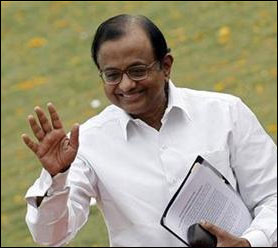Finance Minister P Chidambaram is set to announce a broad outline of the Goods & Services Tax (GST) in Budget 2013-14, after putting his stamp of approval on states’ major decisions at a meeting on Thursday.
 The meet will be crucial as other indirect tax proposals for the Budget, such as service tax and excise duty rates, exemptions and credit rules are likely to be framed keeping in mind the road map for GST.
The meet will be crucial as other indirect tax proposals for the Budget, such as service tax and excise duty rates, exemptions and credit rules are likely to be framed keeping in mind the road map for GST.
Ahead of the Budget session of Parliament, the minister would seek formal approval of the empowered committee of state finance ministers on the design of GST proposed last month in Bhubaneswar by a panel of Centre and state officers.
The states had broadly agreed to make GST optional, provide a floor rate with a narrow band, and do away with the dispute resolution panel, among other things. These decisions would require further changes to the Constitution Amendment Bill being vetted by Parliament’s standing committee on finance.
The Centre and states might agree on giving the former one-third and the latter two-third weightage in the GST Council for taking decisions with a 75 per cent majority. The existing Bill says decisions would be taken by consensus.
After sealing the deal with states on February 14, Chidambaram might recommend the changes to the Parliament panel, so that the Bill could be pushed for consideration and passage. Thereafter, he could introduce the GST legislation in the monsoon session and get it passed in the winter session.
Senior functionaries from both the Centre and states, however, admit it would not be possible to roll out GST by 2014, even with these deadlines. Though there are indications that GST in its final form would be rolled out by the new government at the Centre after the 2014 general elections, Chidambaram is said to be keen to go ahead with preparations for the proposed tax reform to send a positive signal to industry.
To ensure states’ support for GST, the Centre has agreed to provide them Rs 34,000 crore for the last three years as compensation for loss of central sales tax revenues. The finance minister would formally approve the package on Thursday and some provision is likely to be made for it in the Budget.
Experts say Chidambaram might prune the central excise exemption list and keep service tax and the excise duty rate unchanged at 12 per cent, to convey the message that the government is moving towards GST. Currently, about 240 goods are exempt from excise but attract value-added tax. Another 130 items attract a nominal levy of one per cent.
At a meeting with the empowered committee last month, Chidambaram had said he was ready to work overnight and make GST part of his Budget speech, even if states gave their consent just a few days before February 28.









